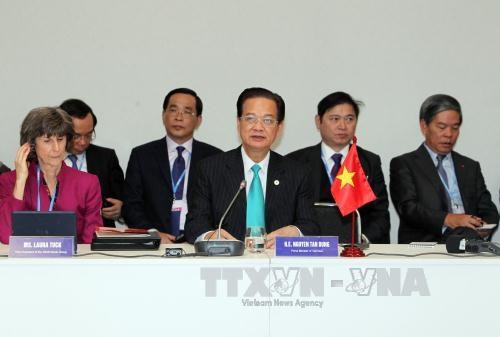Prime Minister Nguyen Tan Dung, together with Netherlands Prime Minister Mark Rutte and Vice President of the World Bank Laura Tusk, co-chaired a high-level dialogue on responding to climate change in the Mekong Delta region held in Paris on November 30.

PM Nguyen Tan Dung addresses the high-level dialogue on responding to climate change in the Mekong Delta region. (Photo: VNA)
The dialogue took place on the sideline of the 21st Conference of the Parties to the United Nations Framework Convention on Climate Change (COP 21).
Addressing the function, the PM expressed his appreciation for the support of the Netherlands Government, the WB and many countries and international organisations for Viet Nam in general and the Mekong Delta region in particular.
In fact, a range of socio-economic development programmes in the delta are being adjusted in line with a blueprint devised as part of the strategic partnership on climate change response and water management between Viet Nam and the Netherlands, he stated.
Concerning priorities of regional growth, he said activities to adapt to climate change and rising sea water level are considered an integral part of the Mekong Delta’s process of economic restructuring and switching to sustainable growth models. These activities have been included in provincial development plans across the region, capitalising on strengths of each localities.
According to the Government leader, Viet Nam is working to integrate disaster risk management and climate change response in plans for urban development and land use. As such, green social infrastructure to counter flooding will be built at residential areas. The use of fossil fuels and the volume of greenhouse gas emissions will be reduced. Mean while, the disaster forecast and alert system will have its capacity boosted, alongside with strengthening measures to effectively cope with natural disasters and climate change.
The PM underlined the need for public awareness campaigns as well as public and business involvement in active disaster control and increased cooperation among regional countries and relevant partners, especially the Mekong River Commission, towards the sustainable exploitation and use of water resources in the Mekong Delta.
He said apart from its own efforts, Viet Nam needs further support from countries and international organisations in adapting to the impacts of climate change.
The Vietnamese government always values and manages the effective use of international funding, he emphasised.
Participants shared the view that climate change is posing challenges to Viet Nam’s socio-economic development, which is one of the five countries hardest hit by climate change. Its Mekong Delta is suffering from the “double” impacts of climate change, rising sea level and unsustainable use of waters and dam construction in the upper reaches of the Mekong River.
Many localities in the region suffered from many storms and severe flooding that caused huge human and economic losses. At the same time, drought leads to increased salinity in the soil, affecting nearly 700,000ha of farming land, or around 40 percent of the total 1.7 million ha in the region.
WB Vice President Laura Tusk hailed Viet Nam for its strong commitment and determination to devise effective ways to address climate change.
She affirmed the WB will work closely with countries and international organisations on the issue and pledged to increase the annual funding for the bank’s member countries to cope with climate change to 29 billion USD.
Netherlands Prime Minister Mark Rutte, for his part, pledged all possible support to Viet Nam in the field.
Concluding the dialogue, Viet Nam, the Netherlands and the WB issued a joint statement calling for global support to Viet nam in coping with climate change in the Mekong Delta.